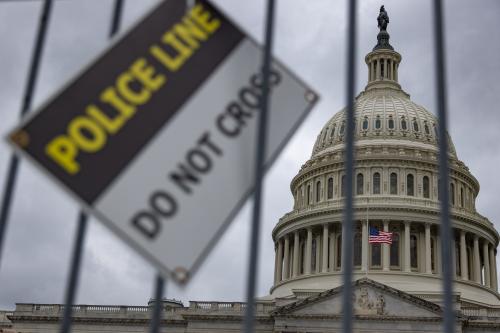If there is a heaven, then Benazir Bhutto, who was in life one of the world’s most serious politicians, may have allowed herself a smile after the returns from Pakistan’s second free election came in. She not only outmanoeuvred President Musharraf, whose days as nominal leader of this sad country are numbered, but managed to keep her party together after her own cruel death, by the improbable device of naming her son and husband as heirs in a hastily written will. Finally, she left this book — a reminder of her wide-ranging interests — as a final statement of what Pakistani politicians should be worried about.
Unlike most of Pakistan’s oligarchic establishment, Benazir was more interested in issues and problems than personality and self. She was, of course, very self-centred, and believed in her own destiny — never quite getting over the princess syndrome. Yet, those who trashed her after her death — when she could not reply — were wrong in their caricature. BB had matured over the years, and towards the end of her life became quite the realist, willing to forgive even the bumbling Bush administration for its tragic delay in looking for a way to prop up the general. Her strategy, of course, was to take this half-way step and use it to leverage a transformation of Pakistani politics, working even with Nawaz Sharif.
Reconciliation, a substantial book but an easy read, deals with two grand themes: the struggle within the Islamic world for an identity that is compatible with its own great traditions and objective changes in the world today, and the difficulty of the West in understanding and, where necessary, accommodating the process. As she rightly points out, Pakistan is one of those places where both struggles are central to the identity of both state and nation, and one full chapter and many asides are devoted to contemporary Pakistani history and politics.
Others have dived into these waters, and there are more scholarly accounts of the struggle within Islam and Pakistan’s troubled past. Benazir can be faulted on these grounds, but by and large she offers a straightforward discussion of the rise of contemporary radicalism in Islam, prefaced by a useful depiction of how the Islamic world was, at one time, at the centre of modern thinking about science, gender and governance. The account owes much to scholars like Fazlur Rahman (on Islam) and Ian Talbot (on Pakistan). As other reviews have noted, the writing is not stylistically coherent (the book was rushed into print after her murder, and it seems in places to be assembled, rather than written). But this should not obscure the fact that she was the only prominent Pakistani politician, and one of the few leaders of the Islamic world, willing to take on the radicals at both the political and intellectual levels.
This task was made immeasurably more difficult by the writings of Samuel P. Huntington, whose theories about a clash of civilisations have been eagerly adopted by extremist Muslims (and Hindus, Jews and Christians). He gets his own chapter. Benazir notes that the great civilisational divide is not so much between “Muslim/Islamic” Pakistan and “Hindu” India, as Huntington wrongly wrote, than within Pakistan itself.
Even the sympathetic reviewer must point out, there are some missing pieces in Benazir’s picture of her own country and of the Islamic world. She focuses only on Muslim-West conflicts, when her own country was shaped so powerfully by Muslim-Hindu ones. There were cases where Muslim rulers managed the relationship well, and others where they failed. She does have nice things to say about Rajiv Gandhi, and looked forward to the prospect of Pakistan-Indian reconciliation, but she badly underestimated the India factor in the army’s distrust of her and her father. The Pakistan army has been willing to support jehadis whose values were antithetical to its own because it saw them as a geostrategic tool. She’s correct in her assessment of Zia as an Islamic zealot, but the average officer is no zealot, and will use whatever instrument is at hand to balance a perceived expansionist and ruthless New Delhi. This awful phase in Pakistan’s history may be coming to an end. It is sad that she will not be around to see her own people, and perhaps the army, roll back these dangerous forces and work out some arrangement with New Delhi (providing Indian leaders have their wits about them and seize the opportunity).
Second, Benazir’s portrayal of her father’s role in Pakistan’s breakup can only be seen in terms of a daughter’s respectful memory. Zulfikar Ali Bhutto was no less responsible than Sheikh Mujib and the hapless General Yahya Khan. He was also the father of Pakistan’s nuclear programme, and was in the forefront of those who sought to sustain hostility with India. One only hopes that her PPP colleagues, the ablest group of politicians plying their trade in Pakistan today, have a more realistic understanding of the past.
Third, the discussion of the West’s mismanagement of relations with the Islamic world goes off into a Chomskyesque tangent, and the huge Indian Muslim population is virtually ignored, even though there are important lessons for Pakistan in accommodating minorities.
These are not quibbles, nor do they detract from the Benazir’s very positive role in Pakistan’s history. The book will help keep alive the memory of a highly talented, committed, if sometimes flawed leader. I was not one of her inner circle, but coming to know her over the wilderness years, it was evident that she was an extraordinary person — totally dedicated to redemocratising her country and restoring it to an honourable place among nations. For this, many of her American acquaintances were willing to undergo the occasional lecture. She could be unsparing, but she became a better listener and a wiser person as she matured. She began to embody the title of this book — Reconciliation — not a small thing in a world of political sharks. Let us hope that the authoritative but not “authorised” biography will be written soon, one that shows how she tried to embody the idea of reconciliation, and for which she was murdered.



Commentary
Op-edBenazir Bhutto: After Death, In Her Own Words
February 24, 2008